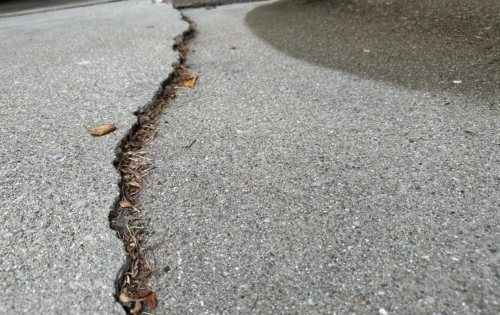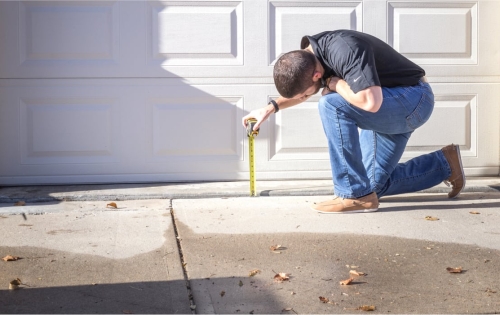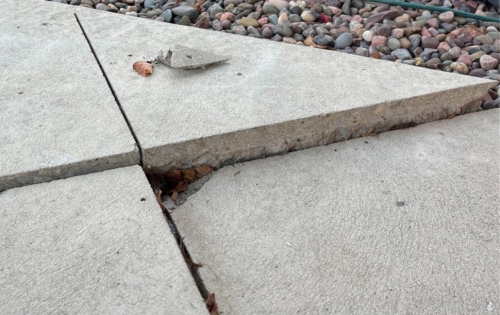What causes pool decks to settle?
Many concrete pool decks are prone to settling because of the pool construction process. The backfill soil added around the pool excavation is not as dense or well-compacted as the undisturbed soil surrounding it. When a heavy concrete slab is poured around the pool, loose soil will often compress under the slab's weight, causing sections of the concrete to sink or settle.
Our Solution for Settled or Sunken Pool Decks
Some contractors still use the old-school method for settled concrete, using heavy equipment to demolish the cracked, settled sections of concrete around your swimming pool and pour a new concrete deck. With concrete replacement, you often get a damaged yard and a pool that's off-limits until the new concrete hardens and cures. We can fix the problem fast and prevent further sinking with our PolyLevel® lifting and leveling solution. PolyLevel is a fast, effective option for repairing your sunken pool deck without disrupting your landscaping.
How It Works
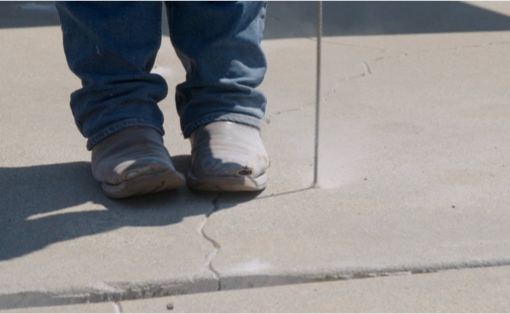
A LevelUp contractor will drill small holes in the slab.
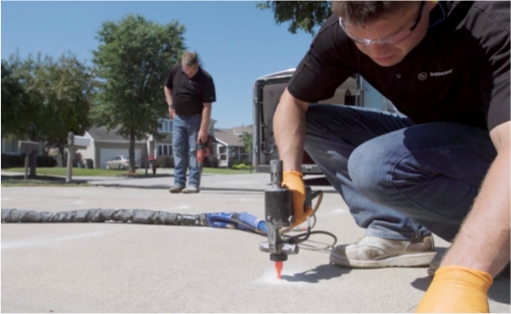
A high-density polyurethane will be injected through the drilled holes. The polymer will spread beneath the slab and lift it.
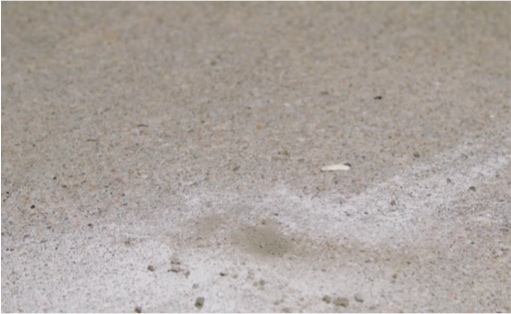
The holes are patched, and the cracks are filled. You'll be able to use your pool deck within one day.
Advantages of PolyLevel
Our PolyLevel lifting and leveling solution offers several distinct advantages over traditional mudjacking methods:
Protect Your Investment
Once your repair is complete, protect your pool deck with our SealantPro solution. Unlike concrete sealers available at big-box stores, SealantPro permanently protects concrete with just one application and extends its life up to 5x longer than DIY solutions.
Developed by Foundation Supportworks, SealantPro is a state-of-the-art material that bonds with concrete on a molecular level, permanently protecting it from water, dirt, and other contaminants in a single coat. Once applied, SealantPro dries in minutes and fully cures in just 6 hours so that you can use your pool deck the same day. It is simple, fast, economical—and highly effective.
Frequently Asked Questions
We have answers to some of the most common questions we get from homeowners about pool deck repair.
-
Can I lift or level sunken concrete myself?
We do not recommend attempting to lift or level concrete yourself as most DIY products require specialized equipment and do not result in a long-lasting solution. Don't hesitate to contact us for a free, no-obligation estimate!
-
Is concrete sealant permanent?
It depends on the product. SealantPro creates a permanent barrier on your concrete, whereas other solutions like DecoShield will need reapplication every 2-3 years for maximum protection and aesthetic appeal.
-
Does concrete sealant need to be reapplied?
It depends on the product. SealantPro is permanent and does not need to be reapplied, whereas other solutions like DecoShield will need reapplication every 2-3 years for maximum protection and aesthetic appeal.
-
Can I seal concrete myself?
While you may find concrete sealant at big-box retailers, those solutions are temporary and will require reapplication at regular intervals (months or years depending on the product). If you're looking for a permanent solution, SealantPro is a concrete sealant that permanently bonds with the concrete surface and creates a waterproof, spill-proof barrier.
-
Can concrete sealant work with concrete that’s been repaired?
Yes! In fact, we recommend protecting your repaired concrete with a sealant so that your repairs last. We offer three concrete sealant systems: SealantPro, DecoShield, and CSS Emulsion.
-
What is concrete sealant?
Concrete sealants are liquid-based materials designed to protect concrete from surface damage and corrosion. Though chemical makeup can differ, there are two major types of concrete sealants: topical and penetrating.
Topical sealants:
- Sit on top of concrete slabs and form a layer that’s impermeable to moisture
- Protect the top, but can trap moisture that enters concrete from beneath the slab
- Best for interior application and smooth surfaces
- Often creates a slick, glossy surface
- Widely available
- Typically last 5-10 years, requires regular reapplication
Penetrating sealants:
- Penetrate the concrete, rather than sitting on top of it
- Can be used on more surface types
- Ideal for exterior applications
- Won’t become slick when wet
- Long-lasting because they don’t wear off the surface and are “breathable”"
-
Do you fix basement or retaining walls?
No. We focus on lifting and leveling slab foundation floors.
-
Does PolyLevel require maintenance?
No. Once it's cured, your driveway/patio/sidewalk/pool deck are ready to use and don't require re-application of PolyLevel unless the underlying soil degrades further.
-
How long does PolyLevel last?
PolyLevel does not react with soil or moisture so it won't erode away over time, effectively making it a permanent solution for filling voids and lifting settled concrete.
-
Is PolyLevel better than mudjacking?
PolyLevel offers many advantages over traditional concrete leveling methods like mudjacking. PolyLevel is significantly lighter at only 2 lbs. per cubic foot compared to 100 lbs. for cement slurry, which means a much more efficient installation process. PolyLevel is less invasive, only requiring holes that are smaller than the size of a dime to be drilled. PolyLevel won't wash away or erode over time, and best of all—it's cured and ready for traffic after just 15 minutes.
-
What is mudjacking or slabjacking?
Mudjacking (or slabjacking) is the process of lifting a concrete slab using a cement slurry, which is usually a mix of sand, water, and cement. Compared to PolyLevel, mudjacking is signficantly heavier, messier, and more time consuming.
-
How soon can I use my driveway/sidewalk/patio/pool deck?
PolyLevel cures very quickly. In fact, you can drive your car over a driveway slab just 15 minutes after it's been lifted with PolyLevel.
-
What causes concrete to crack?
Poorly compacted soil: When your home was built, soil movement around the building site results in poor compaction. Even when the replaced soil is compacted well, it's never as stable as the original soil. Over time, this can cause voids to form and slabs to settle.
Dry soil: Another cause of soil failure is drought. During dry conditions or even just during periods of warm weather and low precipitation, the soil under your concrete will dry out and shrink, creating voids. The concrete above eventually cracks and sinks into these empty spaces, especially if any weight is placed on it.
Flooding: When the rains return, the water has an even easier pathway under the slab due to cracks and crevices left over from the dry period. And this wet, soft soil is too weak to support the concrete above it. In the worst case, the soil erodes and washes away completely, leaving behind large voids that cannot support the weight of the concrete above.
-
Is PolyLevel safe for the environment?
Yes. PolyLevel does not react with soil or moisture, so it will not leach harmful chemicals into the soil.
-
How much does PolyLevel cost?
PolyLevel is a proprietary product developed by Foundation Supportworks and is available exclusively from LevelUp and other concrete repair contractors in the Foundation Supportworks network. The cost for concrete leveling depends on the project's size and application, so don't hesitate to contact us for a free, no-obligation estimate! PolyLevel is cost-effective because it offers a solution that is long-lasting, unlike mudjacking and slab replacement. And your concrete will never cost less to repair than it does right now.
-
What is PolyLevel?
PolyLevel is a two-part urethane polymer that expands into high-density foam to fill voids, lift and stabilize concrete.
-
How much does repairing uneven concrete cost?
Our PolyLevel solution is cost-effective over the long term because it offers a long-lasting solution, unlike mudjacking which can degrade over time. The cost for concrete leveling depends on the project's size and application, so don't hesitate to contact us for a free, no-obligation estimate!
-
What causes concrete to sink?
Poorly compacted soil: When your home was built, soil movement around the building site results in poor compaction. Even when the replaced soil is compacted well, it's never as stable as the original soil. Over time, this can cause voids to form and slabs to settle.
Dry soil: Another cause of soil failure is drought. During dry conditions or even just during periods of warm weather and low precipitation, the soil under your concrete will dry out and shrink, creating voids. The concrete above eventually cracks and sinks into these empty spaces, especially if any weight is placed on it.
Flooding: When the rains return, the water has an even easier pathway under the slab due to cracks and crevices left over from the dry period. And this wet, soft soil is too weak to support the concrete above it. In the worst case, the soil erodes and washes away completely, leaving behind large voids that cannot support the weight of the concrete above.
-
Can I repair cracked concrete myself?
You can, but it might not be a long-lasting solution. While you could seal cracks with urethane caulk found at your local big-box hardware store, that solution is prone to cracking, bubbling, and drying out over time. You'll need to be prepared to monitor and re-seal your cracks regularly, as the conditions that led to your cracked concrete will likely happen again. Our NexusPro solution is highly effective and lasts 5x longer than DIY methods, so contact us and see how we can help!
-
Can NexusPro work with concrete that has been lifted?
Yes. We recommend that our customers seal the cracks and joints of their newly lifted concrete with our NexusPro solution, as it will help protect their concrete for many years.
-
How long does NexusPro concrete sealant last?
Because NexusPro is silicone-based, not urethane-based, it won't degrade over time, even when exposed to UV radiation and extreme temperatures. This ensures that it remains flexible and waterproof for years.
-
What is NexusPro?
NexusPro is a silicone-based sealant for joints and cracks specially formulated to provide long-lasting flexibility and to stand up to harsh weather conditions. Unlike traditional polyurethane sealants, NexusPro resists UV rays, which means it won't crack, bubble, or dry out. That means a single application can seal the joints and cracks in your concrete driveway, patio, pool deck, or sidewalk for years to come, protecting it from damage caused by soil erosion and washout.
-
How much does cracked concrete repair cost?
Our NexusPro solution is cost-effective over the long term because it offers a long-lasting solution, unlike the urethane-based products available at big-box DIY stores that must be replaced regularly. The cost for concrete repair depends on the project's size and application, so don't hesitate to contact us for a free, no-obligation estimate!
Flexible Financing Options
We offer flexible financing options for homeowners in Indiana. During our visit, one of our specialists will help you find a financing option that works for you for practically any job. Our experts are trained to use every resource possible to get you the best financing rates available.
Need a repair? LevelUp is here to help.
Contact us to schedule a free estimate, or book an appointment below.
We're looking forward to meeting you!
